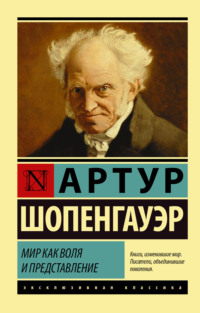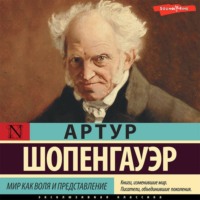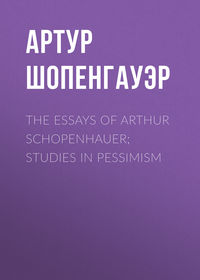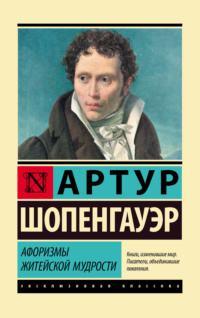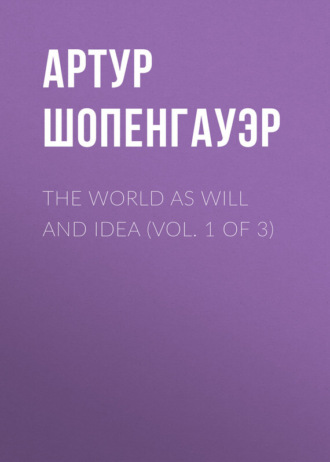 полная версия
полная версияThe World as Will and Idea (Vol. 1 of 3)
As regards the second kind of teleology, according to the division made above, the outer design, which shows itself, not in the inner economy of the organisms, but in the support and assistance they receive from without, both from unorganised nature and from each other; its general explanation is to be found in the exposition we have just given. For the whole world, with all its phenomena, is the objectivity of the one indivisible will, the Idea, which is related to all other Ideas as harmony is related to the single voice. Therefore that unity of the will must show itself also in the agreement of all its manifestations. But we can very much increase the clearness of this insight if we go somewhat more closely into the manifestations of that outer teleology and agreement of the different parts of nature with each other, an inquiry which will also throw some light on the foregoing exposition. We shall best attain this end by considering the following analogy.
The character of each individual man, so far as it is thoroughly individual, and not entirely included in that of the species, may be regarded as a special Idea, corresponding to a special act of the objectification of will. This act itself would then be his intelligible character, and his empirical character would be the manifestation of it. The empirical character is entirely determined through the intelligible, which is without ground, i. e., as thing-in-itself is not subordinated to the principle of sufficient reason (the form of the phenomenon). The empirical character must in the course of life afford us the express image of the intelligible, and can only become what the nature of the latter demands. But this property extends only to the essential, not to the unessential in the course of life to which it applies. To this unessential belong the detailed events and actions which are the material in which the empirical character shows itself. These are determined by outward circumstances, which present the motives upon which the character reacts according to its nature; and as they may be very different, the outward form of the manifestation of the empirical character, that is, the definite actual or historical form of the course of life, will have to accommodate itself to their influence. Now this form may be very different, although what is essential to the manifestation, its content, remains the same. Thus, for example it is immaterial whether a man plays for nuts or for crowns; but whether a man cheats or plays fairly, that is the real matter; the latter is determined by the intelligible character, the former by outward circumstances. As the same theme may be expressed in a hundred different variations, so the same character may be expressed in a hundred very different lives. But various as the outward influence may be, the empirical character which expresses itself in the course of life must yet, whatever form it takes, accurately objectify the intelligible character, for the latter adapts its objectification to the given material of actual circumstances. We have now to assume something analogous to the influence of outward circumstances upon the life that is determined in essential matters by the character, if we desire to understand how the will, in the original act of its objectification, determines the various Ideas in which it objectifies itself, that is, the different forms of natural existence of every kind, among which it distributes its objectification, and which must therefore necessarily have a relation to each other in the manifestation. We must assume that between all these manifestations of the one will there existed a universal and reciprocal adaptation and accommodation of themselves to each other, by which, however, as we shall soon see more clearly, all time-determination is to be excluded, for the Idea lies outside time. In accordance with this, every manifestation must have adapted itself to the surroundings into which it entered, and these again must have adapted themselves to it, although it occupied a much later position in time; and we see this consensus naturæ everywhere. Every plant is therefore adapted to its soil and climate, every animal to its element and the prey that will be its food, and is also in some way protected, to a certain extent, against its natural enemy: the eye is adapted to the light and its refrangibility, the lungs and the blood to the air, the air-bladder of fish to water, the eye of the seal to the change of the medium in which it must see, the water-pouch in the stomach of the camel to the drought of the African deserts, the sail of the nautilus to the wind that is to drive its little bark, and so on down to the most special and astonishing outward adaptations.40 We must abstract however here from all temporal relations, for these can only concern the manifestation of the Idea, not the Idea itself. Accordingly this kind of explanation must also be used retrospectively, and we must not merely admit that every species accommodated itself to the given environment, but also that this environment itself, which preceded it in time, had just as much regard for the being that would some time come into it. For it is one and the same will that objectifies itself in the whole world; it knows no time, for this form of the principle of sufficient reason does not belong to it, nor to its original objectivity, the Ideas, but only to the way in which these are known by the individuals who themselves are transitory, i. e., to the manifestation of the Ideas. Thus, time has no significance for our present examination of the manner in which the objectification of the will distributes itself among the Ideas, and the Ideas whose manifestations entered into the course of time earlier, according to the law of causality, to which as phenomena they are subject, have no advantage over those whose manifestation entered later; nay rather, these last are the completest objectifications of the will, to which the earlier manifestations must adapt themselves just as much as they must adapt themselves to the earlier. Thus the course of the planets, the tendency to the ellipse, the rotation of the earth, the division of land and sea, the atmosphere, light, warmth, and all such phenomena, which are in nature what bass is in harmony, adapted themselves in anticipation of the coming species of living creatures of which they were to become the supporter and sustainer. In the same way the ground adapted itself to the nutrition of plants, plants adapted themselves to the nutrition of animals, animals to that of other animals, and conversely they all adapted themselves to the nutrition of the ground. All the parts of nature correspond to each other, for it is one will that appears in them all, but the course of time is quite foreign to its original and only adequate objectification (this expression will be explained in the following book), the Ideas. Even now, when the species have only to sustain themselves, no longer to come into existence, we see here and there some such forethought of nature extending to the future, and abstracting as it were from the process of time, a self-adaptation of what is to what is yet to come. The bird builds the nest for the young which it does not yet know; the beaver constructs a dam the object of which is unknown to it; ants, marmots, and bees lay in provision for the winter they have never experienced; the spider and the ant-lion make snares, as if with deliberate cunning, for future unknown prey; insects deposit their eggs where the coming brood finds future nourishment. In the spring-time the female flower of the diœcian valisneria unwinds the spirals of its stalk, by which till now it was held at the bottom of the water, and thus rises to the surface. Just then the male flower, which grows on a short stalk from the bottom, breaks away, and so, at the sacrifice of its life, reaches the surface, where it swims about in search of the female. The latter is fructified, and then draws itself down again to the bottom by contracting its spirals, and there the fruit grows.41 I must again refer here to the larva of the male stag-beetle, which makes the hole in the wood for its metamorphosis as big again as the female does, in order to have room for its future horns. The instinct of animals in general gives us the best illustration of what remains of teleology in nature. For as instinct is an action, like that which is guided by the conception of an end, and yet is entirely without this; so all construction of nature resembles that which is guided by the conception of an end, and yet is entirely without it. For in the outer as in the inner teleology of nature, what we are obliged to think as means and end is, in every case, the manifestation of the unity of the one will so thoroughly agreeing with itself, which has assumed multiplicity in space and time for our manner of knowing.
The reciprocal adaptation and self-accommodation of phenomena that springs from this unity cannot, however, annul the inner contradiction which appears in the universal conflict of nature described above, and which is essential to the will. That harmony goes only so far as to render possible the duration of the world and the different kinds of existences in it, which without it would long since have perished. Therefore it only extends to the continuance of the species, and the general conditions of life, but not to that of the individual. If, then, by reason of that harmony and accommodation, the species in organised nature and the universal forces in unorganised nature continue to exist beside each other, and indeed support each other reciprocally, on the other hand, the inner contradiction of the will which objectifies itself in all these ideas shows itself in the ceaseless internecine war of the individuals of these species, and in the constant struggle of the manifestations of these natural forces with each other, as we pointed out above. The scene and the object of this conflict is matter, which they try to wrest from each other, and also space and time, the combination of which through the form of causality is, in fact, matter, as was explained in the First Book.42
§ 29. I here conclude the second principal division of my exposition, in the hope that, so far as is possible in the case of an entirely new thought, which cannot be quite free from traces of the individuality in which it originated, I have succeeded in conveying to the reader the complete certainty that this world in which we live and have our being is in its whole nature through and through will, and at the same time through and through idea: that this idea, as such, already presupposes a form, object and subject, is therefore relative; and if we ask what remains if we take away this form, and all those forms which are subordinate to it, and which express the principle of sufficient reason, the answer must be that as something toto genere different from idea, this can be nothing but will, which is thus properly the thing-in-itself. Every one finds that he himself is this will, in which the real nature of the world consists, and he also finds that he is the knowing subject, whose idea the whole world is, the world which exists only in relation to his consciousness, as its necessary supporter. Every one is thus himself in a double aspect the whole world, the microcosm; finds both sides whole and complete in himself. And what he thus recognises as his own real being also exhausts the being of the whole world – the macrocosm; thus the world, like man, is through and through will, and through and through idea, and nothing more than this. So we see the philosophy of Thales, which concerned the macrocosm, unite at this point with that of Socrates, which dealt with the microcosm, for the object of both is found to be the same. But all the knowledge that has been communicated in the two first books will gain greater completeness, and consequently greater certainty, from the two following books, in which I hope that several questions that have more or less distinctly arisen in the course of our work will also be sufficiently answered.
In the meantime one such question may be more particularly considered, for it can only properly arise so long as one has not fully penetrated the meaning of the foregoing exposition, and may so far serve as an illustration of it. It is this: Every will is a will towards something, has an object, an end of its willing; what then is the final end, or towards what is that will striving that is exhibited to us as the being-in-itself of the world? This question rests, like so many others, upon the confusion of the thing-in-itself with the manifestation. The principle of sufficient reason, of which the law of motivation is also a form, extends only to the latter, not to the former. It is only of phenomena, of individual things, that a ground can be given, never of the will itself, nor of the Idea in which it adequately objectifies itself. So then of every particular movement or change of any kind in nature, a cause is to be sought, that is, a condition that of necessity produced it, but never of the natural force itself which is revealed in this and innumerable similar phenomena; and it is therefore simple misunderstanding, arising from want of consideration, to ask for a cause of gravity, electricity, and so on. Only if one had somehow shown that gravity and electricity were not original special forces of nature, but only the manifestations of a more general force already known, would it be allowable to ask for the cause which made this force produce the phenomena of gravity or of electricity here. All this has been explained at length above. In the same way every particular act of will of a knowing individual (which is itself only a manifestation of will as the thing-in-itself) has necessarily a motive without which that act would never have occurred; but just as material causes contain merely the determination that at this time, in this place, and in this matter, a manifestation of this or that natural force must take place, so the motive determines only the act of will of a knowing being, at this time, in this place, and under these circumstances, as a particular act, but by no means determines that that being wills in general or wills in this manner; this is the expression of his intelligible character, which, as will itself, the thing-in-itself, is without ground, for it lies outside the province of the principle of sufficient reason. Therefore every man has permanent aims and motives by which he guides his conduct, and he can always give an account of his particular actions; but if he were asked why he wills at all, or why in general he wills to exist, he would have no answer, and the question would indeed seem to him meaningless; and this would be just the expression of his consciousness that he himself is nothing but will, whose willing stands by itself and requires more particular determination by motives only in its individual acts at each point of time.
In fact, freedom from all aim, from all limits, belongs to the nature of the will, which is an endless striving. This was already touched on above in the reference to centrifugal force. It also discloses itself in its simplest form in the lowest grade of the objectification of will, in gravitation, which we see constantly exerting itself, though a final goal is obviously impossible for it. For if, according to its will, all existing matter were collected in one mass, yet within this mass gravity, ever striving towards the centre, would still wage war with impenetrability as rigidity or elasticity. The tendency of matter can therefore only be confined, never completed or appeased. But this is precisely the case with all tendencies of all phenomena of will. Every attained end is also the beginning of a new course, and so on ad infinitum. The plant raises its manifestation from the seed through the stem and the leaf to the blossom and the fruit, which again is the beginning of a new seed, a new individual, that runs through the old course, and so on through endless time. Such also is the life of the animal; procreation is its highest point, and after attaining to it, the life of the first individual quickly or slowly sinks, while a new life ensures to nature the endurance of the species and repeats the same phenomena. Indeed, the constant renewal of the matter of every organism is also to be regarded as merely the manifestation of this continual pressure and change, and physiologists are now ceasing to hold that it is the necessary reparation of the matter wasted in motion, for the possible wearing out of the machine can by no means be equivalent to the support it is constantly receiving through nourishment. Eternal becoming, endless flux, characterises the revelation of the inner nature of will. Finally, the same thing shows itself in human endeavours and desires, which always delude us by presenting their satisfaction as the final end of will. As soon as we attain to them they no longer appear the same, and therefore they soon grow stale, are forgotten, and though not openly disowned, are yet always thrown aside as vanished illusions. We are fortunate enough if there still remains something to wish for and to strive after, that the game may be kept up of constant transition from desire to satisfaction, and from satisfaction to a new desire, the rapid course of which is called happiness, and the slow course sorrow, and does not sink into that stagnation that shows itself in fearful ennui that paralyses life, vain yearning without a definite object, deadening languor. According to all this, when the will is enlightened by knowledge, it always knows what it wills now and here, never what it wills in general; every particular act of will has its end, the whole will has none; just as every particular phenomenon of nature is determined by a sufficient cause so far as concerns its appearance in this place at this time, but the force which manifests itself in it has no general cause, for it belongs to the thing-in-itself, to the groundless will. The single example of self-knowledge of the will as a whole is the idea as a whole, the whole world of perception. It is the objectification, the revelation, the mirror of the will. What the will expresses in it will be the subject of our further consideration.43
Third Book. The World As Idea.
Second Aspect. The Idea Independent Of The Principle Of Sufficient Reason: The Platonic Idea: The Object Of Art
Τί τὸ ὄν μὲν ἀεί, γένεσιν δὲ οὐκ ἔχον; καὶ τί τό γιγνόμενον μὲν καὶ ἀπολλύμενον, ὄντως δε οὐδέποτε ὄν. – ΠΛΑΤΩΝ.
§ 30. In the First Book the world was explained as mere idea, object for a subject. In the Second Book we considered it from its other side, and found that in this aspect it is will, which proved to be simply that which this world is besides being idea. In accordance with this knowledge we called the world as idea, both as a whole and in its parts, the objectification of will, which therefore means the will become object, i. e., idea. Further, we remember that this objectification of will was found to have many definite grades, in which, with gradually increasing distinctness and completeness, the nature of will appears in the idea, that is to say, presents itself as object. In these grades we already recognised the Platonic Ideas, for the grades are just the determined species, or the original unchanging forms and qualities of all natural bodies, both organised and unorganised, and also the general forces which reveal themselves according to natural laws. These Ideas, then, as a whole express themselves in innumerable individuals and particulars, and are related to these as archetypes to their copies. The multiplicity of such individuals is only conceivable through time and space, their appearing and passing away through causality, and in all these forms we recognise merely the different modes of the principle of sufficient reason, which is the ultimate principle of all that is finite, of all individual existence, and the universal form of the idea as it appears in the knowledge of the individual as such. The Platonic Idea, on the other hand, does not come under this principle, and has therefore neither multiplicity nor change. While the individuals in which it expresses itself are innumerable, and unceasingly come into being and pass away, it remains unchanged as one and the same, and the principle of sufficient reason has for it no meaning. As, however, this is the form under which all knowledge of the subject comes, so far as the subject knows as an individual, the Ideas lie quite outside the sphere of its knowledge. If, therefore, the Ideas are to become objects of knowledge, this can only happen by transcending the individuality of the knowing subject. The more exact and detailed explanation of this is what will now occupy our attention.
§ 31. First, however, the following very essential remark. I hope that in the preceding book I have succeeded in producing the conviction that what is called in the Kantian philosophy the thing-in-itself, and appears there as so significant, and yet so obscure and paradoxical a doctrine, and especially on account of the manner in which Kant introduced it as an inference from the caused to the cause, was considered a stumbling-stone, and, in fact, the weak side of his philosophy, – that this, I say, if it is reached by the entirely different way by which we have arrived at it, is nothing but the will when the sphere of that conception is extended and defined in the way I have shown. I hope, further, that after what has been said there will be no hesitation in recognising the definite grades of the objectification of the will, which is the inner reality of the world, to be what Plato called the eternal Ideas or unchangeable forms (ειδῆ); a doctrine which is regarded as the principal, but at the same time the most obscure and paradoxical dogma of his system, and has been the subject of reflection and controversy of ridicule and of reverence to so many and such differently endowed minds in the course of many centuries.
If now the will is for us the thing-in-itself, and the Idea is the immediate objectivity of that will at a definite grade, we find that Kant's thing-in-itself, and Plato's Idea, which to him is the only οντως ον, these two great obscure paradoxes of the two greatest philosophers of the West are not indeed identical, but yet very closely related, and only distinguished by a single circumstance. The purport of these two great paradoxes, with all inner harmony and relationship, is yet so very different on account of the remarkable diversity of the individuality of their authors, that they are the best commentary on each other, for they are like two entirely different roads that conduct us to the same goal. This is easily made clear. What Kant says is in substance this: – “Time, space, and causality are not determinations of the thing-in-itself, but belong only to its phenomenal existence, for they are nothing but the forms of our knowledge. Since, however, all multiplicity, and all coming into being and passing away, are only possible through time, space, and causality, it follows that they also belong only to the phenomenon, not to the thing-in-itself. But as our knowledge is conditioned by these forms, the whole of experience is only knowledge of the phenomenon, not of the thing-in-itself; therefore its laws cannot be made valid for the thing-in-itself. This extends even to our own ego, and we know it only as phenomenon, and not according to what it may be in itself.” This is the meaning and content of the doctrine of Kant in the important respect we are considering. What Plato says is this: – “The things of this world which our senses perceive have no true being; they always become, they never are: they have only a relative being; they all exist merely in and through their relations to each other; their whole being may, therefore, quite as well be called a non-being. They are consequently not objects of a true knowledge (επιστημη), for such a knowledge can only be of what exists for itself, and always in the same way; they, on the contrary, are only the objects of an opinion based on sensation (δοξα μετ᾽ αισθησεως αλογου). So long as we are confined to the perception of these, we are like men who sit in a dark cave, bound so fast that they cannot turn their heads, and who see nothing but the shadows of real things which pass between them and a fire burning behind them, the light of which casts the shadows on the wall opposite them; and even of themselves and of each other they see only the shadows on the wall. Their wisdom would thus consist in predicting the order of the shadows learned from experience. The real archetypes, on the other hand, to which these shadows correspond, the eternal Ideas, the original forms of all things, can alone be said to have true being (οντως ον), because they always are, but never become nor pass away. To them belongs no multiplicity; for each of them is according to its nature only one, for it is the archetype itself, of which all particular transitory things of the same kind which are named after it are copies or shadows. They have also no coming into being nor passing away, for they are truly being, never becoming nor vanishing, like their fleeting shadows. (It is necessarily presupposed, however, in these two negative definitions, that time, space, and causality have no significance or validity for these Ideas, and that they do not exist in them.) Of these only can there be true knowledge, for the object of such knowledge can only be that which always and in every respect (thus in-itself) is; not that which is and again is not, according as we look at it.” This is Plato's doctrine. It is clear, and requires no further proof that the inner meaning of both doctrines is entirely the same; that both explain the visible world as a manifestation, which in itself is nothing, and which only has meaning and a borrowed reality through that which expresses itself in it (in the one case the thing-in-itself, in the other the Idea). To this last, which has true being, all the forms of that phenomenal existence, even the most universal and essential, are, according to both doctrines, entirely foreign. In order to disown these forms Kant has directly expressed them even in abstract terms, and distinctly refused time, space, and causality as mere forms of the phenomenon to the thing-in-itself. Plato, on the other hand, did not attain to the fullest expression, and has only distinctly refused these forms to his Ideas in that he denies of the Ideas what is only possible through these forms, multiplicity of similar things, coming into being and passing away. Though it is perhaps superfluous, I should like to illustrate this remarkable and important agreement by an example. There stands before us, let us suppose, an animal in the full activity of life. Plato would say, “This animal has no true existence, but merely an apparent existence, a constant becoming, a relative existence which may just as well be called non-being as being. Only the Idea which expresses itself in that animal is truly ‘being,’ or the animal in-itself (αυτο το θηριον), which is dependent upon nothing, but is in and for itself (καθ᾽ ἑαυτο, αει ὡς αυτως); it has not become, it will not end, but always is in the same way (αει ον, και μηδεποτε ουτε γυγνομενον ουτε απολλυμενον). If now we recognise its Idea in this animal, it is all one and of no importance whether we have this animal now before us or its progenitor of a thousand years ago, whether it is here or in a distant land, whether it presents itself in this or that manner, position, or action; whether, lastly, it is this or any other individual of the same species; all this is nothing, and only concerns the phenomenon; the Idea of the animal alone has true being, and is the object of real knowledge.” So Plato; Kant would say something of this kind, “This animal is a phenomenon in time, space, and causality, which are collectively the conditions a priori of the possibility of experience, lying in our faculty of knowledge, not determinations of the thing-in-itself. Therefore this animal as we perceive it at this definite point of time, in this particular place, as an individual in the connection of experience (i. e., in the chain of causes and effects), which has come into being, and will just as necessarily pass away, is not a thing-in-itself, but a phenomenon which only exists in relation to our knowledge. To know it as what it may be in itself, that is to say, independent of all the determinations which lie in time, space, and causality, would demand another kind of knowledge than that which is possible for us through the senses and the understanding.”




